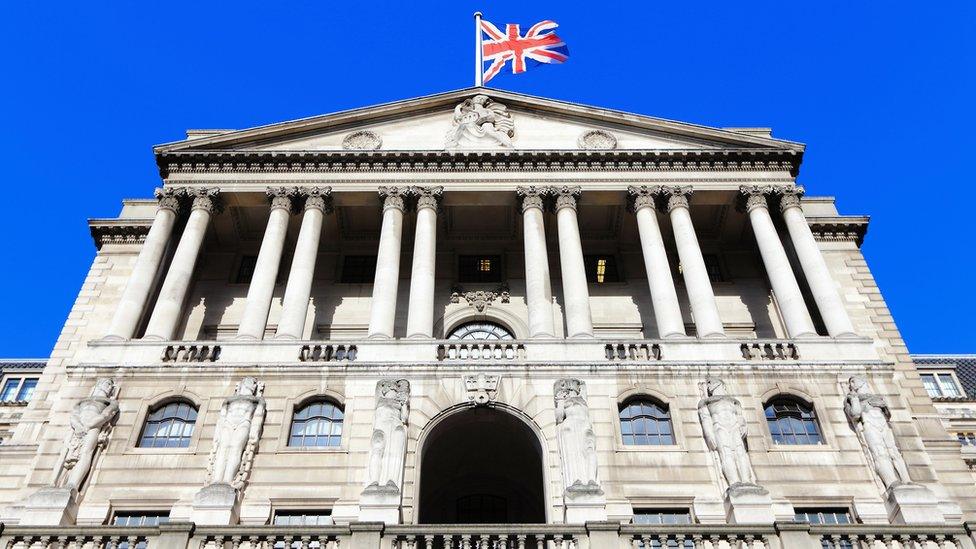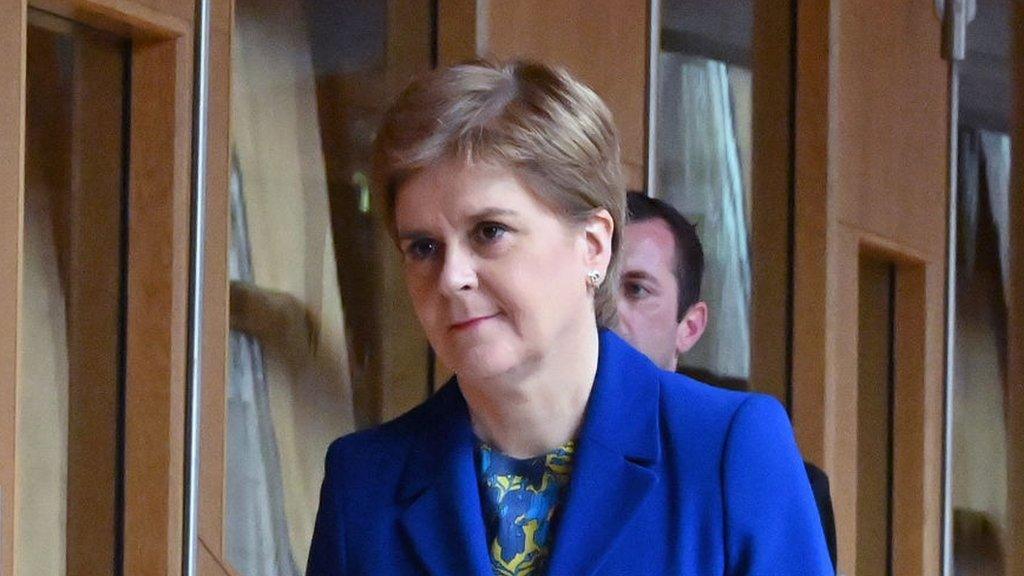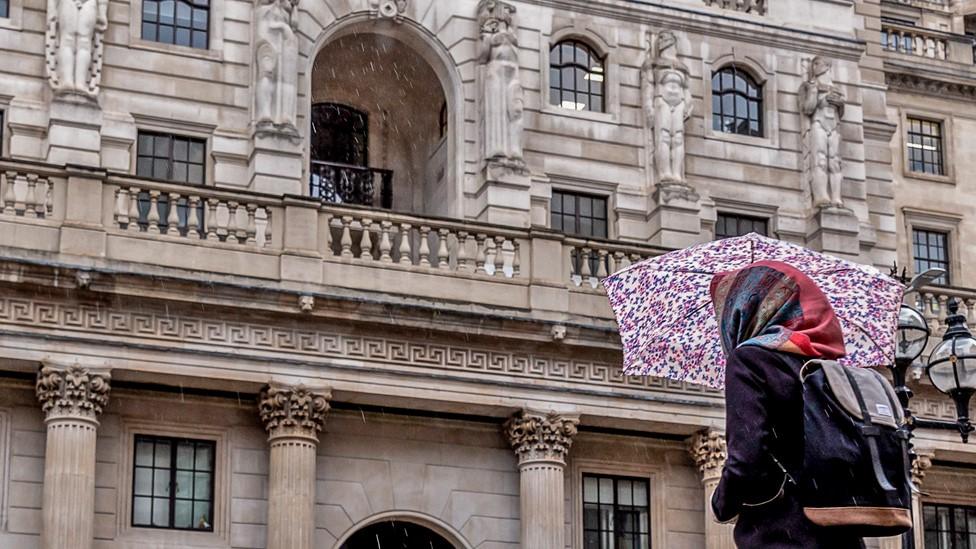Kwarteng splurge meets unintended consequences
- Published

A new regime in Downing Street wanted to chuck out the need to add things up, the old guard and the economic orthodoxies.
But they have found that uncosted borrowing is not without severe constraints.
The implications are roiling currency and bond markets, and feed directly into the market for mortgages and beyond.
Liz Truss wowed the Tory membership over the summer with a promise to cut tax and take on the "abacus economics" of the Treasury.
The abacus, as they've known since ancient times, is a useful tool for calculating numbers. But to the new prime minister, the idea that things should have to add up is one for the economic policy museum.
So out went the orthodoxy, joined in the Whitehall skip by the top mandarin at the Treasury, Sir Tom Scholar. And in came Kwasi Kwarteng, a chancellor with a mini-budget that's had a maxi impact cutting tax, with a special emphasis on helping the highest earners and the most profitable companies.
What was missing was the other side of the ledger. If there are not to be spending cuts on the same spectacular scale - and we're told last year's spending review will not be revisited - there will have to be borrowing. Lots of it.
How much? We don't know, because the Office for Budget Responsibility was told not to publish any estimates based on the new tax, spend and borrowing decisions - at least for now.
What we did get was the Treasury's estimate of how much borrowing might be required if it is successful in using tax cuts to boost growth.

There's a catch there. Only Kwasi Kwarteng and his political fan club believe those growth rates are going to be achieved. Liz Truss probably thinks so too, because she put her name to an article about it for the Mail on Sunday. But since then, she's been oddly low key, to the point of being invisible.
Others tend to think the unintended consequences of the mini-budget will counteract any advantage to growth from taxpayers getting some money back next year, with which to boost spending.
Those unintended consequences stem from a brief departure from the low-tax, high growth message in the prime minister's article: "Our pursuit of growth will be reinforced by a responsible approach to the public finances," she said. "We will set out our approach more fully in due course, including how we plan to get our national debt down over the medium term."
That "due course" has not run as expected. On Friday, financial markets were already giving the prime minister the thumbs down. Re-opening on Asia on Monday morning, they took the pound down to record lows against the US dollar. Sterling recovered a tad, but it remains weak and precariously close to the psychological tripwire of parity with the dollar.
The US dollar has been strengthening against other currencies, as the safe haven when the economic storm clouds are gathering. And they are gathering.

The OECD developed nations economic club issued a very downbeat assessment of the world economy on Monday, blaming most of it on Russia, and flagging up further concerns about the Chinese property bubble.
Among other things, the report said: "Fiscal support can help cushion the impact of high energy costs on households and companies, but should be concentrated on aiding the most vulnerable and preserve incentives to reduce energy consumption."
"Fiscal actions to cushion living standards must avoid persistent stimulus at a time of high inflation. Means-tested transfers to households broadly meet this criteria."
All those conditions are the precise opposite of what the new Liz Truss administration had chosen to do. Its measures to mitigate energy price rises - indiscriminately fired at all businesses and households at much higher cost than similar countries - not only mask the incentive to cut energy demand. They also add fuel to the inflationary fire following the tax-cutting mini-budget. All at just the wrong moment for the global economy.
The International Monetary Fund (IMF) offered its commentary along similar lines, on Tuesday evening, UK-time. Not usually given to such strong criticism, at least of developed economies, its choice to become involved implied that Britain could be a problem for precarious financial markets more widely, and could carry the risk of contagion.
The IMF used to be seen as the global force for neo-liberal privatisation and de-regulation, yet it told Britain that the inequality in its choice of fiscal measures is not just a social problem but an economic one.

Moody's, one of the big three credit ratings agencies, joined in the criticism with similar stinging comment, as have financial commentators in Britain and around the world. There is incredulity about the mini-budget's lack of any discernible fiscal discipline to reassure investors that there is a limit to this borrowing splurge.
The very people you might expect to cheer a tax cut to boost growth - which includes removing the cap on financial sector bonuses - are among the most scathing.
The choreography of statements from the Bank of England and from the UK government, with further comment from central bank officials, suggest Treasury ministers have been put in an arm-lock. They emphasised that their dash for growth must be sustainable (in an economic sense at least), and that markets can be reassured that they will get an independent assessment of what this means for growth, inflation and borrowing from the Office for Budget Responsibility.
That pledge was secured from the Treasury on Monday, promising that fiscal plans will be set out on 23 November - nearly two months away.
Markets usually aren't that patient. Wednesday brought a private warning from the insurance industry that it faces solvency difficulties from having insured others against rising interest rates. That's why the Bank of England plunged into the market, to buy long-dated UK government bonds, thus helping to push down interest rates.
Bonds explained
It might help to explain, so here goes.
The UK borrows by selling bonds to institutional investors, including banks, who pay with the money we then use for public services and so on.
These bonds ('gilts' because the Bank of England used to issue them with a gold edging) are a promise to deliver a coupon, or an interest payment each year, and they run for a set number of years, which differs from one bond issue to the next.
There are more than two trillion pounds-worth of such promises out there, and once issued, they are traded. If they are attractive to enough investors, as with any commodity, more demand means the price goes up. When that happens, the yield, or interest payment, becomes less valuable relative to the price being paid. That means interest rates automatically fall.
And vice versa. If investors don't like the look of UK government bonds, they sell them. If enough traders do so, that lowers the price, and the interest rate on that bond automatically goes up.

The Bank of England is stepping in to calm financial markets after the government's mini-budget caused turmoil
That's what we've seen happening. UK government bonds have been dumped, so the price goes down and interest rates up. It meant that pension funds, holding a lot of these bonds, were seeing the value of their portfolios fall rapidly, pushing them into serious difficulties.
With that growing systemic risk, the Bank of England has stepped in to buy a lot of UK government bonds to raise the price and lower the interest rate on them. It's doing so at an urgent pace, through to 14 October, and will be carried out "on whatever scale is necessary".
And if you're finding this a bit confusing, you're not alone. The central bank's announcement sent the value of the pound sharply up, very briefly, before going sharply down.
Getting stuck into bond-buying has already taken the interest rate on a 30-year government bond from 5% interest to around 4%. And that feeds through the wholesale market to the mortgage lenders, who are seeking to price the cost of money before they commit to lending.
Many of them have temporarily withdrawn from the market, to await developments, but with the certainty that when they will return, their interest rates will be higher.
And while these may look similar to the rates being paid before the 2008 financial crash - since when, interest rates have been exceptionally low - the gearing of loans has changed a lot.
Property prices have risen faster than incomes, the ratio of loan-to-income is also up, so servicing a bigger mortgage than in past decades at even 4 or 5% feels like a much heavier burden than it used to do.
Will it affect the housing market? Certainly. But we don't yet know how. It's a reasonable bet that recent rapid inflation in the price of a home will at least slow up. Some lenders are war-gaming a significant fall in prices.
That's the story so far. There's lots of it still to go. The price to Britain's economic credibility won't become clear for some time. And there's the fall-out politically for a prime minister and chancellor whose term in office looks to have started very, very badly.
- Published28 September 2022

- Published12 October 2022

- Published28 September 2022
- Published23 September 2022

